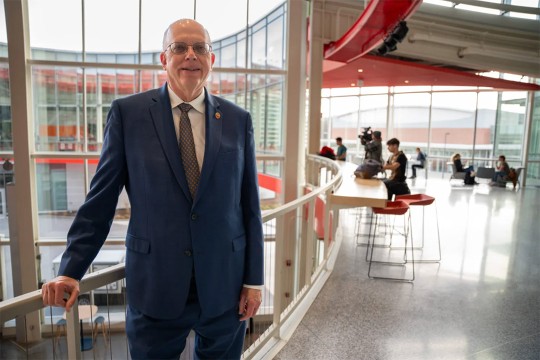RIT and Center for Advanced Defense Studies Partner on Anti-Terrorism Degree
The master’s program focuses on “the science and technology of nonproliferation and counterterrorism,” says James Myers, director of RIT’s Center for Multidisciplinary Studies, which is managing the new degree. Studies in counterterrorism, cyber security, and chemical, biological, radiological, nuclear and explosive defense will prepare defense experts, emergency management professionals, intelligence officials and other decision makers to handle present and future threats, Myers says.
A series of weeklong and weekend courses will be instructed in a blended format—in person at the center’s headquarters in Washington and via distance learning. Eight courses, featuring guest speakers from government, higher education and the private sector, will be offered this fall. Elective courses cover counterterrorism, intelligence analysis, cyber security and terrorist groups. The first classes in the program begin this month.
Newton Howard, founder and chairman of the Center for Advanced Defense Studies, will direct many of the courses. An advisor to the U.S. Department of Homeland Security and an expert on intelligence analysis, information operations and cyber security for the Homeland Security Policy Research Institute, Howard has joined the RIT faculty as a research professor in the Center for Advancing the Study of Cyberinfrastructure.
“Increasing capacity in homeland security, cyber defense and counterterrorism are part of the national security strategy,” says Howard. “Our faculty, with their real world experience, will arm students with the knowledge required to counter current and future threats.”
Guy Johnson, executive director of RIT’s Center for Advancing the Study of Cyberinfrastructure, says: “Newton Howard is a valuable addition to the RIT faculty. He will enable us to pursue initiatives in homeland security and bring together the skills already present across the RIT faculty.”
Other partners include the Cyberspace Security Policy Research Institute, the Homeland Security Policy Institute and the Space and Advanced Communications Research Institute, each at George Washington University; the University of Illinois at Springfield; Illinois Institute of Technology; and the University of Lyon in France.
To earn an RIT master’s degree in cross-disciplinary professional studies, students will complete 12 courses and 48 credit hours during 18 months of part-time studies. RIT graduate certificate programs in cyber security and information assurance are planned.
Note: The Center for Advanced Defense Studies is a non-profit, non-governmental research and educational institute based in Washington, D.C. The center coordinates and directs research and education in decision making under conditions of uncertainty, cognitive informatics, cyber security and information assurance, counterterrorism and global security policy, international relations and global security simulations, biodefense and other areas. For more information, visit http://www.c4ads.org/rit_programs.














